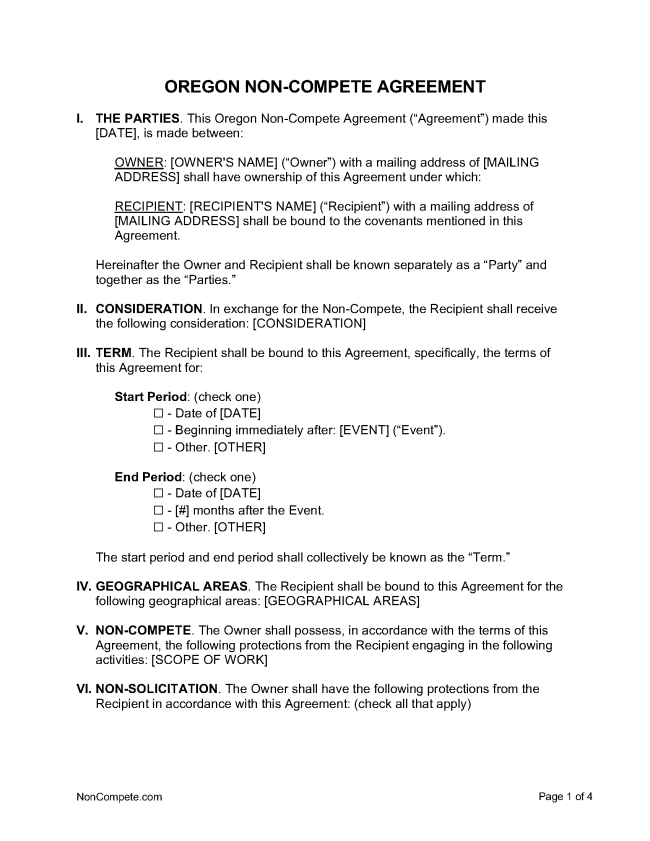An Oregon non-compete agreement is a set of provisions found in various types of contracts. In the last two decades, Oregon has passed several laws to formalize how non-compete agreements are to be viewed, placing particular limits on non-competes in employment contracts.
These laws have changed frequently, and the content below reflects the rules as of Jan. 1, 2022. However, because the laws are not retroactive, if a non-compete was created or signed before that date, it may be advisable to consult with a local attorney.
Table of Contents |
Are Non-Competes Enforceable in Oregon?
Yes, under limited circumstances. Non-competes are enforceable if they are:
- Limited to a particular amount of time or a specific territory;
- Made for valid consideration; and
- Reasonable, meaning it adequately protects a legitimate business interest but is not so extensive as to interfere with the public interest.
These requirements apply to all non-compete agreements. Non-competes that are part of employment contracts face extensive added restrictions. Generally, non-competes in the employment agreement context are enforceable if:
- They are in writing and provided in advance;
- As defined by Or. Rev. Stat. Ann. § 653.020(3), the employee performs administrative, executive, or professional work;
- The employer has a legitimate protectable interest as described in the statute;
- The employee makes a salary of at least $100,533, adjusted annually for inflation; and
- The employer provides a signed, written copy of the agreement to the employee within 30 days of the employee’s termination.
Or. Rev. Stat. Ann. § 653.295.
Formalities
If a non-compete agreement is a condition of employment, employers must inform employees in writing at least two weeks before starting work. Or. Rev. Stat. Ann. § 653.295(1)(a).
For employees who are already working, the offer must come with some advance in the employee’s status, such as a raise, increased responsibility, or a new title. Nike, Inc. v. McCarthy (2004).
Exceptions
Employees who do not work in administrative, executive, or professional fields, or those who make less than the minimum salary identified above, may still be subject to a non-compete agreement if, once the employee is prohibited from working, the employer offers the greater of:
- Half of the employee’s salary at the time of stopping work for the employer; or
- A sum equal to fifty percent of the minimum salary identified above.
Or. Rev. Stat. Ann. § 653.295(7).
Legitimate Business Interest
For purposes of Or. Rev. Stat. Ann. § 653.295, a legitimate business interest exists when:
- The covered employee has access to trade secrets;
- The covered employee has access to confidential information that is competitively sensitive but does not meet the definition of a trade secret; or
- The employee is in the broadcast industry, and the employer meets the requirements in Or. Rev. Stat. Ann. § 653.295(2)(c).
In non-compete agreements for the sale of a business, protecting the company’s good will is a legitimate business interest. (Eldridge v. Johnston (1952)).
Non-Solicitation
Non-solicitation agreements are treated differently under Oregon law and are not automatically void. Specifically, agreements not to (1) solicit employees of the former employer or (2) solicit or transact business with customers of the former employer may be enforceable. Or. Rev. Stat. Ann. § 653.295(5)(b).
Prohibited Professions
Agreements that prevent attorneys from representing clients in the future are void when contained in employment contracts, partnership agreements or similar instruments, or case settlements. However, reasonable restrictions on practice may be included as part of a retirement agreement. Rule 5.6, Oregon Rules of Professional Conduct.
Terminating an Employee
It is unclear whether terminating an employee makes a non-compete agreement unenforceable. In Nike, Inc. v. McCarthy (2003), the federal district court for the District of Oregon found that the fact that the employee was terminated did not make the agreement unenforceable, but noted that this was in part because the circumstances of the employee’s termination included a severance package, limiting concerns that the company had acted in bad faith.
Burden of Proof
Once a former employee chooses to treat a non-compete agreement as void, the employer must prove that the agreement is valid and enforceable. (Oregon Psychiatric Partners, LLP v. Henry (2022)).
Continued Employment (consideration)
Oregon requires a “bona fide advancement” for a non-compete to be enforceable against an employee working for the same firm, so continued employment is not adequate consideration to support a non-compete agreement. Or. Rev. Stat. Ann. § 653.295(1)(a)(B)
Maximum Term
In an employment agreement, non-competes may be enforced for up to one year. Or. Rev. Stat. Ann. § 653.295(3).
Blue Penciling (allowed)
Where a portion of a non-compete agreement is unreasonable, but the parties’ intent is clear, Oregon courts will enforce the agreement to the extent that it is reasonable. In Kelite Products v. Brandt (1956), the Oregon Supreme Court stated that a reasonable time restriction, although absent from the agreement’s text, was “implied” by a review of the circumstances of the case.
